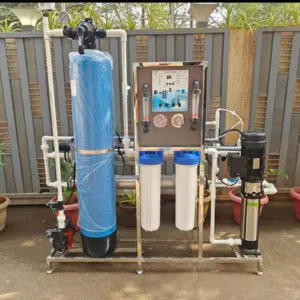Hard water causes scale in taps, appliances, and pipes—reducing efficiency and lifespan. Our 2000 LPH domestic water softener solves this for large homes and small commercial setups by treating up to 2,000 litres per hour.
Using ion-exchange resin, it removes calcium and magnesium, replacing them with sodium to deliver soft, appliance-safe water. With a durable, corrosion-resistant tank and automatic regeneration, it ensures low maintenance and continuous protection for your plumbing and appliances.
- High Capacity: Treats up to 2,000 litres/hour, perfect for large homes.
- Fully Automatic Regeneration: Set it and forget it—no manual cycles needed.
- Durable Resin & Vessel: Long-life ion-exchange resin and rust-proof FRP tank.
- Hardness Reduction: Delivers soft water with <50 ppm residual hardness.
- Appliance Protection: Prevents scaling in geysers, washing machines, and pipelines.
- Energy Efficient: Works on standard 230 V power with minimal consumption.
- Compact Fit: Slim design for space-saving installation near tanks or overheads.
|
Parameter |
Value |
|
Flow Rate |
2,000 LPH |
|
Hardness Tolerance |
500–1,500 ppm CaCO₃ |
|
Treated Hardness Output |
<50 ppm CaCO₃ |
|
Vessel Size |
~13 × 54 inches |
|
Valve Size |
~25 NB |
|
Salt Tank Capacity |
~40 kg |
|
Operating Pressure |
1.5–3.5 kg/cm² |
|
Max Temperature |
~47 °C |
|
Power Supply |
230 V AC / 6 Amp |
-
Whole-House Coverage: Delivers 2000 LPH soft water—ideal for villas, large homes, and small businesses.
-
Advanced Resin Technology: Reduces hardness to <50 ppm, preventing scale buildup in pipes and appliances.
-
Fully Automatic & Low Maintenance: Regenerates on its own; just refill salt when needed.
-
Durable & Space-Saving: Corrosion-resistant FRP build fits neatly near tanks or tight spaces.
-
Efficiency & Protection: Enhances appliance life, reduces detergent use, and keeps skin and hair healthy.
1. What does 2000 LPH mean?
It treats 2,000 litres of water per hour—suitable for homes with multiple bathrooms or commercial setups.
2. Will it work in very hard water areas?
Yes. It supports input hardness levels up to 1,500 ppm CaCO₃. For extremely hard water, consider pre-treatment.
3. Is it safe for drinking water?
Yes, softened water is generally safe. People on low-sodium diets may opt for potassium-based resin.
4. How much space does it need?
Moderate space is required for the vessel and salt tank. Installation area should be near a water source and drain.
5. How often does regeneration occur?
Typically every 1–3 days based on usage and hardness levels. Fully automatic systems manage this seamlessly.
6. Does it reduce TDS or contaminants?
No. It only removes hardness minerals. Use a RO+UV purifier for drinking water treatment.


